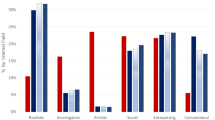Abstract
Increasing numbers of engineers from developed countries are employed during some part of their careers in lesser-developed nations (LDN’s), or they may design products for use in LDN’s. Yet determining the implications of professional engineering codes for engineers’ conduct in such settings can be difficult. Conditions are often substantially different from those in developed countries, where the codes were formulated. In this paper I explore the implications of what I call the “welfare requirement” in engineering codes for professional engineering conduct in LDN’s.
Similar content being viewed by others
References
As far as I am aware, the first philosophically significant paper to address this issue is Eugene Schlossberger’s, The Responsibility of Engineers, Appropriate Technology, and Lesser Developed Nations, Science and Engineering Ethics 3/3 (July, 1997): 317–326. Although Schlossberger’s paper is not as specifically code-oriented as mine, I nevertheless view my work here as a continuation of his.
Davis, M. (1991) Thinking Like An Engineer, Philosophy and Public Affairs (Spring) 20/2: 164–165.
DeGeorge, R. (1993) Competing with Integrity in International Business, Oxford University Press, New York, p. vi.
DeGeorge, pp. 45–56.
See The International Bill of Human Rights, with a forward by Jimmy Carter (1981) Entwhistle Books, Glenn Ellen, CA. No author.
For a list of what he calls “fundamental international rights”, see Donaldson, T. (1989) The Ethics of International Business, Oxford University Press, New York, p. 81.
Goodin, R.E. (1985) Protecting the Vulnerable: A Reanalysis of Our Social Responsibilities, University of Chicago Press, Chicago, pp. 195–196.
Baum, R.J. (1994) Engineers and the Public: Sharing Responsibilities, in. Wueste, D.E., ed.: Professional Ethics and Social Responsibility, Rowman and Littlefield, Lanaham, MD.
For the actual case, see Tavis, L.A. (1997) Power and Responsibility: Multinational Managers and Developing Country Concerns, University of Notre Dame Press, Notre Dame, IN, pp. 315–338.
Tavis, p.322
Tavis, p.322
Tavis, p.322
Tavis, p.317
Tavis, p.322
Tavis, p. 317
Tavis, p. 327.
Author information
Authors and Affiliations
Rights and permissions
About this article
Cite this article
Harris, C.E. Engineering responsibilities in lesser-developed nations: The welfare requirement. SCI ENG ETHICS 4, 321–331 (1998). https://doi.org/10.1007/s11948-998-0024-z
Issue Date:
DOI: https://doi.org/10.1007/s11948-998-0024-z




